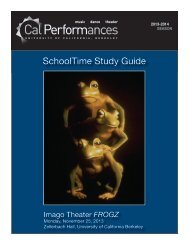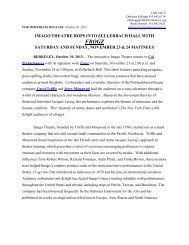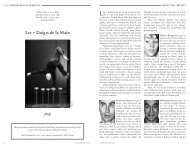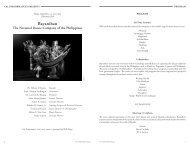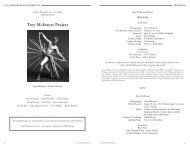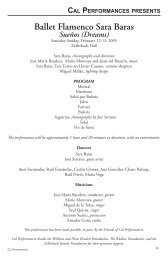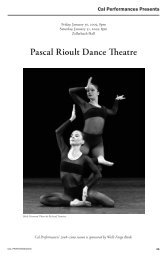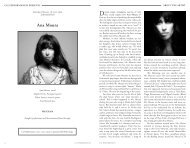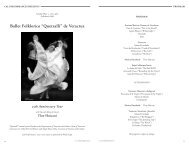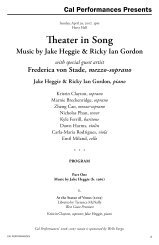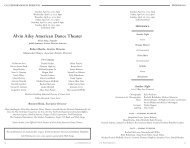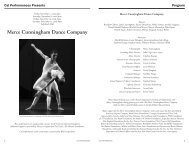Perm Ballet notes.indd - Cal Performances
Perm Ballet notes.indd - Cal Performances
Perm Ballet notes.indd - Cal Performances
Create successful ePaper yourself
Turn your PDF publications into a flip-book with our unique Google optimized e-Paper software.
CAL PERFORMANCES PRESENTS<br />
4<br />
Th ursday, April 6, 2006, 8pm<br />
Friday, April 7, 2006, 8pm<br />
Saturday, April 8, 2006, 8pm<br />
Sunday, April 9, 2006, 3pm<br />
Zellerbach Hall<br />
Tchaikovsky <strong>Perm</strong><br />
<strong>Ballet</strong> & Orchestra<br />
Swan Lake<br />
A <strong>Ballet</strong> in Th ree Acts<br />
Music by Pyotr Ilyich Tchaikovsky<br />
Production conceived and directed by Natalia Makarova<br />
George Isaakyan, Artistic Director of the Th eatre<br />
Natalia Akhmarova, Artistic Director of the <strong>Ballet</strong><br />
Valery Platonov, Principal Conductor<br />
Robert Cole, Principal Guest Conductor<br />
Th is performance is made possible, in part, by the National Endowment for the Arts<br />
and by the Vodafone-US Foundation.<br />
<strong>Cal</strong> <strong>Performances</strong> thanks our Centennial Season Sponsor, Wells Fargo.<br />
CAL PERFORMANCES<br />
Th ursday, April 6, 2006, 8pm<br />
Friday, April 7, 2006, 8pm<br />
Saturday, April 8, 2006, 8pm<br />
Sunday, April 9, 2006, 3pm<br />
Zellerbach Hall<br />
Tchaikovsky <strong>Perm</strong><br />
<strong>Ballet</strong> & Orchestra<br />
Swan Lake<br />
A <strong>Ballet</strong> in Th ree Acts<br />
Production conceived and directed by Natalia Makarova<br />
Music Pyotr Ilyich Tchaikovsky<br />
Choreography Natalia Makarova (after Marius Petipa and<br />
Lev Ivanov)<br />
Artistic Director of the Th eatre George Isaakyan<br />
Artistic Director of the <strong>Ballet</strong> Natalia Akhmarova<br />
Principal Conductor Valery Platonov<br />
Principal Guest Conductor Robert Cole<br />
Additional Choreography Sir Frederick Ashton<br />
Set Design Peter Farmer<br />
Costume Design Galina Solovyeva<br />
Production Coordinator Dina Makaroff<br />
Production Assistant Olga Evreinoff<br />
Lighting Sergei Martynov<br />
<strong>Ballet</strong> Coaches<br />
Rimma Shlyamova, Valentina Baikova, Olga Lukina, Olga Salimbaeva<br />
<strong>Ballet</strong> Manager Vitaly Dubrovin<br />
PROGRAM<br />
CAL PERFORMANCES 5
CAST<br />
Odette/Odile Elena Kulagina (April 8)<br />
Natalia Moiseeva (April 6, 7, 9)<br />
Prince Siegfried Sergei Mershin (April 6, 7, 9)<br />
Alexey Tyukov (April 8)<br />
Benno Sergei Mershin (April 8)<br />
Alexey Tyukov (April 6, 7, 9)<br />
Rothbart Igor Soloviev<br />
Th e Queen Mother Galina Dubrovina<br />
Master of Ceremonies Vitaly Dubrovin<br />
Pas de Trois<br />
Yara Araptanova, Natalia Makina, Alexey Tyukov (April 6, 7, 9)<br />
Ekaterina Guschina, Irina Rybkina, Sergei Mershin (April 8)<br />
Four Cygnets<br />
Victoria Ananyan, Elena Levina, Irina Rybkina, Ekaterina Tarasova<br />
Th ree Big Swans<br />
Yara Araptanova, Ekaterina Guschina, Yulia Manjeles<br />
Spanish Dance<br />
Tatiana Kolchanova, Elena Kulichkova, Artem Pozdeev, Arthur Shesterikov<br />
Hungarian Dance<br />
Maria Gorbunova, Elena Khamzina, Anastasia Kostyuk, Alexei Lysenko, Ekaterina Mosienko,<br />
Konstantin Olyunin, Anna Poistogova, Ilya Shitov, Roman Tarkhanov, Maksim Temnikov<br />
Neapolitan Dance<br />
Victoria Ananyan, Ivan Poroshin, Albina Rangulova, Daria Sosnina,<br />
Roman Tarkhanov, Nadezhda Vasilkova, Svetlana Zakhlebina<br />
Mazurka<br />
Elena Levina, Lyudmila Manjeles, Irina Markova, Elena Morozova,<br />
Andrei Popov, Evgeny Rogov, Igor Starovalov, Mikhail Timashev<br />
Brides<br />
Yara Araptanova, Ekaterina Guschina, Natalia Makina,<br />
Yulia Manjeles, Irina Rybkina, Ekaterina Tarasova<br />
Knights<br />
Evgeny Konobeev, Vitaly Poleshchuk, Igor Starovatov, Alexandr Volkov<br />
Sarabande<br />
Ksenia Barbashova, Konstantin Bolshukhin, Tatyana Bolshukhina, Vladimir Dorofeev,<br />
Yulia Gogoleva, Elena Khamzina, Elena Kobeleva, Evgeny Konobeev, Sergei Kreker,<br />
Daria Levenkova, Nikolai Mityashin, Ekaterina Panchenko, Oleg Posokhin<br />
Act 1<br />
It is the eve of Prince Siegfried’s coming-of-age<br />
party. His companions, led by Benno, are preparing<br />
their own celebration for him. Th e Prince arrives<br />
and is soon enjoying himself with his friends.<br />
Th e festivities are unexpectedly interrupted by<br />
the arrival of the Queen Mother. She takes her<br />
son aside, insisting that the time has now come<br />
when he must assume the responsibilities of the<br />
kingdom. She presents him with the emblem that<br />
is the symbol of his kingship. As King, one of the<br />
fi rst matters he must consider is that of his marriage.<br />
Siegfried pleads with her, but the Queen reminds<br />
him that he is obligated to choose a fi ancée<br />
at the ball. His mother’s words weigh heavily on<br />
his soul. He is saddened that he will lose his freedom<br />
and that he has not yet met someone who<br />
would touch his heart.<br />
As twilight sets in, the Prince remains preoccupied<br />
with his thoughts. Benno sees a fl ight of swans<br />
and urges Siegfried to go hunting in hope that the<br />
diversion will dispel his melancholic mood. Siegfried<br />
goes off into the woods and Benno follows,<br />
but their paths diverge.<br />
Wandering alone deep in the forest, Siegfried<br />
discovers a mysterious moonlit lake. Unbeknownst<br />
to him, this is the domain of the evil Sorcerer who<br />
has cast a spell on young maidens, turning them<br />
into swans. Siegfried prepares to shoot as he sees<br />
a swan gliding across the lake. To his astonishment,<br />
when the swan reaches the shore she is suddenly<br />
transformed. Her beauty overwhelms the<br />
Prince. She is Odette, Queen of the Swans, who<br />
has been enchanted by the evil Sorcerer. Although<br />
SYNOPSIS<br />
frightened, Odette tells the Prince the story of her<br />
plight. Th e spell that keeps them swans by day and<br />
maidens at night can only be broken if a man who<br />
has never loved before swears eternal fi delity to<br />
her. From the moment of their meeting, Siegfried<br />
knows that he was right to believe in the existence<br />
of a perfect love. Never before has he given his<br />
heart to anyone, but without hesitation he off ers<br />
it to Odette. As dawn approaches, the Sorcerer<br />
exerts his power, and Odette is forced away from<br />
Siegfried’s arms. Siegfried realizes his fate is now<br />
entwined with hers.<br />
Act 2<br />
Th e guests are arriving for the formal ball to<br />
celebrate Prince Siegfried’s coming of age. Th e<br />
Queen Mother enters and is disturbed to fi nd that<br />
Siegfried is not there. Soon, he arrives, but he is<br />
preoccupied by his thoughts. Th ree Knights present<br />
the prospective fi ancées to the court. Courteously,<br />
Siegfried dances with each of them, but his<br />
hear is now pledged to Odette and, despite his<br />
mother’s insistence, he refuses to choose.<br />
Suddenly, an unknown Knight appears, the<br />
evil Sorcerer in disguise, accompanied by the ravishing<br />
and devious Odile. Siegfried is mesmerized<br />
by her striking resemblance to his beloved Odette.<br />
Odile enchants and beguiles him. Any doubts that<br />
Siegfried may have about Odile’s identity are dispensed<br />
with. Siegfried becomes convinced that she<br />
is Odette and declares that he has chosen her to be<br />
his bride. Th e Knight intervenes, demanding that<br />
Prince Siegfried swear an oath of fi delity to Odile.<br />
He willingly does so. Before the Prince’s eyes, a vision<br />
of the inconsolable Odette appears. He realizes<br />
that he has been deceived. Triumphant, the<br />
evil Sorcerer and Odile disappear. Grief-stricken,<br />
Siegfried runs to the lakeside.<br />
Act 3<br />
Nighttime. A deep sadness has descended on<br />
the lake of swans. Th ey are now doomed by the<br />
spell to remain swans forever. Rushing through<br />
the frightening storm created by the evil Sorcerer,<br />
Siegfried searches for Odette to beg her forgiveness.<br />
Odette forgives him, but she knows that<br />
nothing can be changed. Death is their only salvation.<br />
Th e waves of the lake unite the lovers forever.<br />
Th e power of the evil Sorcerer is destroyed.<br />
In a vision, Odette and Siegfried approach an<br />
ideal and eternal love.<br />
6 CAL PERFORMANCES<br />
CAL PERFORMANCES 7
PROGRAM NOTES<br />
Swan Lake by Pyotr Ilyich Tchaikovsky is a masterpiece<br />
of world classical choreography. Of all<br />
ballets, it is the best known and most popular.<br />
Its secret is not only in the perfection of the<br />
great composer’s music, but also in that extraordinarily<br />
deep, poetic thought which it inspires<br />
and powerfully expresses. It is in the psychological<br />
essence of the ballet with its complex heroes’<br />
characters, whose fate we are following with great<br />
interest.<br />
Tchaikovsky’s great ballet was fi rst staged at<br />
the Bolshoi Th eatre in 1877. Th ose interested in<br />
the history of ballet will know that the premiere<br />
failed, and that its failure was not very surprising,<br />
as the talented composer had left most of the ballet<br />
traditions of his time far behind. In fact, the<br />
great work became worthy of its stage life only<br />
after its creator’s death, symbolizing the contradictions<br />
in Russian art at that time.<br />
Swan Lake was fi rst staged at the <strong>Perm</strong> Th eatre<br />
in 1931. Having been re-staged there more than<br />
10 times, it has become a highlight of the theatre’s<br />
repertoire. It is therefore not by chance that the<br />
<strong>Perm</strong> <strong>Ballet</strong> performed Swan Lake at the Bregenz<br />
Festival in Austria 20 years ago to inaugurate the<br />
Company’s fi rst Western tour.<br />
At diff erent periods of its existence, the ballet<br />
Swan Lake has been presented to the audience as<br />
a fairytale or a fantastic poem, a realistic novel or<br />
8<br />
a philosophical parable. But in all these versions<br />
it remained a drama, purely lyrical and spiritual,<br />
exciting us as a real event.<br />
It is this classical version of the undying ballet<br />
that has come to us, telling of an eternal story<br />
of love, of delusions and hopes, of a belief into<br />
human beauty, which holds out against falsehood<br />
and evil.<br />
Th e <strong>Perm</strong> <strong>Ballet</strong>’s present, fully staged production<br />
of Swan Lake is choreographed and directed<br />
by Natalia Makarova, the superstar of the legendary<br />
Kirov <strong>Ballet</strong> and renowned companies of the<br />
West, who for many years thrilled the world as<br />
the preeminent Odette/Odile. Now she has given<br />
<strong>Perm</strong> her own version of Tchaikovsky’s tale of immortal<br />
love.<br />
Note: When Natalia Makarova staged her production<br />
of Swan Lake for the London Festival <strong>Ballet</strong><br />
in 1988, Sir Frederick Ashton was by her side. He<br />
was present during Ms. Makarova’s rehearsals of the<br />
Final Act, giving her an entirely free hand to use his<br />
choreography as she thought fi t and to make emendations<br />
that seemed necessary for her conception of the<br />
ballet. He trusted her fully and was happy with the<br />
changes that she made. In Ms. Makarova’s current<br />
production, Ashton’s choreography includes the Waltz<br />
in Act 1, Scene 1, and a portion of the Final Act.<br />
CAL PERFORMANCES<br />
Pyotr Ilyich Tchaikovsky was born in May<br />
1840, in the town of Kamsko-Votkinsk in<br />
central Russia. After working for a time as a<br />
clerk in the Ministry of Justice, he began fulltime<br />
musical study at the age of 23, when the<br />
great pianist Anton Rubenstein established a<br />
local conservatory. Two years later, he became<br />
a teacher of harmony at a new conservatory in<br />
Moscow, a position he held for 13 years.<br />
By 1876, he had attained eminence as the<br />
composer of a variety of beautiful music. During<br />
this period, despite being psychologically<br />
unsuited for it, he married a former conservatory<br />
student named Antonina Miliukova, a<br />
neurotic girl who is said to have forced Tchaikovsky<br />
into the union by threatening suicide<br />
if he refused her. So desperate was the young<br />
composer to extricate himself from the “rash<br />
act” (his brother Modest’s term for the alliance)<br />
that, after a few weeks of marriage, he<br />
attempted to contract a fatal case of pneumonia<br />
by standing for several hours in the frigid<br />
Moscow River. Instead, he suff ered a nervous<br />
breakdown and another brother, Anatol, took<br />
him to Switzerland to recover.<br />
Meanwhile, a more welcome infl uence<br />
entered Tchaikovsky’s life. Nadejda von Meck<br />
was a middle-aged, wealthy widow with as<br />
burning a passion for the composer’s music<br />
as the unfortunate Antonina had for the man<br />
himself. In 1877, the generous, if eccentric<br />
Mme. von Meck bestowed 6,000 roubles a<br />
year on Tchaikovsky, enabling him to leave<br />
the conservatory and devote all of his time to<br />
composition.<br />
Tchaikovsky insisted on one condition,<br />
however: they must never meet, but communicate<br />
by correspondence only. His patroness<br />
readily assented, and it was an agreement they<br />
kept for 14 years.<br />
Th e period of subsidy by Mme. von Meck<br />
was abundantly productive for Tchaikovsky.<br />
Among many other works, he completed the<br />
ballet Sleeping Beauty and the opera Eugene<br />
Onegin, his fourth and fi fth symphonies and<br />
Th e Nutcracker. In St. Petersburg in 1893,<br />
Tchaikovsky fi nished his sixth symphony,<br />
the Pathétique, during a period of almost un-<br />
ABOUT THE ARTISTS<br />
breakable psychological depression. Ten days<br />
after conducting the fi rst performance of the<br />
new work, he drank—perhaps not accidentally—a<br />
glass of contaminated river water and<br />
died of cholera on November 6, 1893.<br />
Natalia Makarova (choreographer) began her<br />
career in her native Leningrad, entering the<br />
Vaganova School at the age of 13, where she<br />
was placed in a special experimental class condensing<br />
the nine-year program into six. After<br />
graduating, she joined the Kirov <strong>Ballet</strong>, rapidly<br />
rising to the rank of Ballerina. She came<br />
to international prominence when she danced<br />
Giselle, which became one of her signature<br />
roles, with the Kirov in London. She won the<br />
Gold Medal in Varna in 1965.<br />
On September 4, 1970, while on tour in<br />
London with the Kirov <strong>Ballet</strong>, Ms. Makarova<br />
requested asylum in Britain. Soon thereafter,<br />
she began her career with American <strong>Ballet</strong><br />
Th eatre, making her debut with the company<br />
in Giselle. She danced American <strong>Ballet</strong><br />
Th eatre’s vast repertory, working extensively<br />
with Antony Tudor (Dark Elegies, Lilac<br />
Garden, Pillar of Fire, Romeo and Juliet),<br />
George Balanchine (Theme and Variations,<br />
Apollo), Jerome Robbins and Glen Tetley.<br />
Ms. Makarova’s association with the Royal<br />
<strong>Ballet</strong> began in 1972; her repertoire with that<br />
company includes Swan Lake, Giselle, Th e<br />
Sleeping Beauty, Manon, Song of the Earth, A<br />
Month in the Country, Concerto, Dances at a<br />
Gathering, Serenade, Les Biches and Kenneth<br />
MacMillan’s Romeo and Juliet.<br />
Ms. Makarova has appeared as guest artist<br />
with major ballet companies worldwide. Her<br />
repertory includes Onegin (for which she<br />
won the Evening Standard Award in 1985);<br />
La Bayadère; Th e Firebird; Don Quixote;<br />
Coppélia; La Fille Mal Gardée; Notre Dame<br />
de Paris; Carmen; Proust; Le Jeune Homme<br />
et la Mort; John Cranko’s Romeo and Juliet;<br />
Raymonda; and La Sylphide. Among the<br />
ballets and pas de deux created especially for<br />
Makarova are Robbins’s Other Dances; Sir<br />
Frederick Ashton’s Le Rossignol; a MacMillan<br />
Pas de Deux; Neumeier’s Epilogue; Tetley’s<br />
CAL PERFORMANCES 9
ABOUT THE ARTISTS<br />
Contradance; Petit’s Blue Angel; Bejart’s<br />
Mephisto; and Gaad’s Miraculous Mandarin.<br />
In 1980, Ms. Makarova staged the fi rst<br />
full-length production of La Bayadère for<br />
American <strong>Ballet</strong> Th eatre, making it the fi rst<br />
company in the West to perform the work.<br />
Her production of La Bayadère is now in the<br />
repertoire of companies around the world,<br />
including the Royal <strong>Ballet</strong>; La Scala <strong>Ballet</strong>;<br />
Teatro Colón in Buenos Aires: Neumeier’s<br />
Hamburg <strong>Ballet</strong>; and the Australian <strong>Ballet</strong>.<br />
Ms. Makarova has also staged Giselle for the<br />
Royal Swedish <strong>Ballet</strong>. Among her other productions<br />
are Paquita for American <strong>Ballet</strong> Th eatre,<br />
National <strong>Ballet</strong> of Canada, the Korean<br />
<strong>Ballet</strong> and San Francisco <strong>Ballet</strong>; Th e Sleeping<br />
Beauty for the Royal <strong>Ballet</strong>; and Swan Lake<br />
for London Festival <strong>Ballet</strong>, Teatro Municipal<br />
in Rio de Janeiro and, in 2005, for the <strong>Perm</strong><br />
<strong>Ballet</strong>.<br />
Her television work includes the four-part<br />
Ballerina series, which she wrote and presented<br />
for the BBC; Assoluta and Th e Leningrad<br />
Legend (BBC); In a Class of Her Own (Channel<br />
4); and Natasha (Th ames Television). She has<br />
also been fi lmed performing in Swan Lake,<br />
Giselle, Romeo and Juliet and La Bayadère.<br />
Ms. Makarova wrote and presented the BBC<br />
documentary St. Petersburg to Tashkent for the<br />
Great Railway Journeys series.<br />
Ms. Makarova’s A Dance Autobiography<br />
was published by Knopf in 1979. In 1991, she<br />
recorded narrations of Th e Snow Queen, Prince<br />
Ivan and the Frog Princess and Th e Firebird for<br />
Delos Records, each of which received the<br />
American Library Association Award. She has<br />
also received the Dance Magazine Award for<br />
her distinguished career.<br />
She made her Broadway musical comedy<br />
debut in On Your Toes, winning numerous<br />
awards, including the Tony Award as Best<br />
Actress in a Musical, the Drama Desk Award,<br />
Outer Critics Circle Award, Th eatre World<br />
Award, Astaire Award and the Stanislavsky<br />
Award. In 1984, she starred in the West End<br />
production of On Your Toes, for which she<br />
won the Laurence Olivier Award.<br />
On February 1, 1989, after 19 years’<br />
absence, she was the fi rst artistic exile to be<br />
10<br />
invited back to perform in the Soviet Union.<br />
She returned to her native Leningrad, where<br />
she danced with the Kirov <strong>Ballet</strong> on the stage<br />
where she began her career. A documentary<br />
of her historic visit, Makarova Returns, was<br />
shown on BBC television.<br />
In 1991, she made her debut as a dramatic<br />
actress in the Chichester Festival production<br />
of Tovarich, which transferred to the West<br />
End. She returned to Russia in 1992 in<br />
the play Two for the Seesaw, performing in<br />
Moscow and St. Petersburg. In 1997, she<br />
starred in the Chichester Festival production<br />
of George Bernard Shaw’s play Misalliance.<br />
Ms. Makarova most recent appearance<br />
on stage was in Noel Coward’s play Blithe<br />
Spirit in England, where she played the role<br />
of Elvira. Ms. Makarova continues to stage<br />
classical ballets throughout the world.<br />
Peter Farmer (set designer) has designed for<br />
most of the major ballet companies in the<br />
world, including seven ballets for the Royal<br />
<strong>Ballet</strong>, nine for London Festival <strong>Ballet</strong>, 12 for<br />
London Contemporary Dance Th eatre, 10<br />
for the Houston <strong>Ballet</strong>, six for London City<br />
<strong>Ballet</strong>, fi ve for Sadler’s Wells Royal <strong>Ballet</strong> and<br />
works for the Royal Danish <strong>Ballet</strong>, American<br />
<strong>Ballet</strong> Th eatre, the Rome and Cologne<br />
opera houses, the Stuttgart <strong>Ballet</strong>, the Royal<br />
Winnipeg <strong>Ballet</strong>, New London <strong>Ballet</strong>, <strong>Ballet</strong><br />
Rambert, Th e Scottish <strong>Ballet</strong>, Northern<br />
<strong>Ballet</strong> Th eatre, the Dutch National <strong>Ballet</strong>, the<br />
Washington <strong>Ballet</strong> and Chicago City <strong>Ballet</strong>.<br />
His work includes designs for Th e Sleeping<br />
Beauty for the Munich Opera House; Anna<br />
Karenina and Th e Th ree Musketeers for the<br />
Australian <strong>Ballet</strong>; Giselle in Texas and Rio de<br />
Janeiro; Swan Lake for the Royal Winnipeg<br />
and Hong Kong ballets and, most recently,<br />
for the <strong>Perm</strong> <strong>Ballet</strong>; Th e Great Gatsby for<br />
Pittsburgh <strong>Ballet</strong> Th eatre; Th e Nutcracker<br />
for Cincinnati <strong>Ballet</strong> Company; La Sylphide<br />
for the Teatro Municipal Rio de Janeiro; A<br />
Midsummer Night’s Dream for the Hirofumi<br />
Inoue <strong>Ballet</strong> de Chambre in Tokyo; and<br />
Balanchine’s Th eme and Variations and<br />
Divertimento No. 15 for Sadler’s Wells (now<br />
Birmingham) Royal <strong>Ballet</strong>.<br />
CAL PERFORMANCES<br />
Mr. Farmer has collaborated with Robert<br />
Cohan and Robert North on numerous productions<br />
for London Contemporary Dance<br />
Th eatre. Th ese include Cohan’s Stages, No-<br />
Man’s Land, Sky, Consolations of the Rising<br />
Moon, Stone Garden, In Memory, Metamorphoses,<br />
Crescendo, North’s Meeting, Parting and<br />
Troy Game.<br />
He designed Anna Karenina for the <strong>Ballet</strong><br />
de Santiago and the Norwegian <strong>Ballet</strong>; La<br />
Traviata for London City <strong>Ballet</strong>; Cinderella<br />
for the Cincinnati <strong>Ballet</strong>; Giselle for the Star<br />
Dancers <strong>Ballet</strong> Foundation in Tokyo; Coppélia<br />
for the Portuguese National <strong>Ballet</strong> and the<br />
Inoue <strong>Ballet</strong> Foundation in Tokyo; and Th e<br />
Nutcracker for Pittsburgh <strong>Ballet</strong>. He designed<br />
Kenneth MacMillan’s Winter Dreams for the<br />
Royal <strong>Ballet</strong> and Manon for the Australian,<br />
Vienna and Houston ballets. In 1991, Mr.<br />
Farmer designed Peter Darrell’s Tales of<br />
Hoff mann for the Hong Kong <strong>Ballet</strong> and Les<br />
Sylphides and Coppélia for the Birmingham<br />
Royal <strong>Ballet</strong>, returning to Birmingham in<br />
1995 to design Ashton’s Birthday Off ering.<br />
He also designed the full-length Butterfl y for<br />
the Australian <strong>Ballet</strong> and Swan Lake for the<br />
English National <strong>Ballet</strong> at the Royal Albert<br />
Hall in London.<br />
Th e Tchaikovsky Opera and <strong>Ballet</strong> Th eater<br />
of <strong>Perm</strong> is one of Russia’s most distinguished<br />
artistic companies. Its ballet company became<br />
a permanent institution in the mid-1920s.<br />
A performance of Giselle opened the<br />
Company’s fi rst ballet season on February 2,<br />
1926. Since then, the theater has produced a<br />
growing number of classical and contemporary<br />
works, with an emphasis on the operas and<br />
ballets of Pyotr Ilyich Tchaikovsky.<br />
Th e magic of Ulanova, Dudinskaya,<br />
Sergeyev, Vecheslova and other Kirov artists<br />
profoundly infl uenced the appearance of the<br />
nation’s third-in-importance ballet company,<br />
which shares the standards and the style of the<br />
famous Kirov school. Th e <strong>Ballet</strong> Company is<br />
unique in that it draws all of its dancers from<br />
its own school, which is the most prestigious<br />
training institution for ballet in Russia.<br />
ABOUT THE ARTISTS<br />
Th e school entered a new phase upon<br />
the arrival of the outstanding ballet teachers<br />
Ludmila Sakharova, its present artistic<br />
director, Yuly Plakht and Galina Kuznetsova,<br />
who represent a new breed of Russian ballet<br />
stars, trained in the classical pattern, but who<br />
bring together musicality, theatrical passion<br />
and superb technical skill.<br />
Former graduates and dancers of the<br />
<strong>Perm</strong> <strong>Ballet</strong> School, whose names are known<br />
the world over, include Galina Ragozina-<br />
Panova, Lyubov Kunakova, Galina Shlyapina,<br />
Nadezhda Pavlova (who went on to become<br />
a prima ballerina with the Bolshoi Th eatre),<br />
Olga Tchenchikova, Marat Daukayev and<br />
various Mariinsky stars.<br />
Today, a new generation of artists, such<br />
as Elena Kulagina (the Company’s prima<br />
ballerina and People’s Artist of Russia),<br />
Natalia Moiseeva, Yulia Mashkina and Vitaly<br />
Poleschuk, have distinguished themselves in<br />
national and international ballet competitions<br />
and festivals and have won international<br />
fame.<br />
With 70 dancers, including one People’s<br />
Artist, three Honored Artists of Russia<br />
amd four winners of major international<br />
competitions, the Company’ is dedicated to<br />
establishing and maintaining a solid tradition<br />
of superior Russian classical dance.<br />
Th e Company’s varied repertoire highlights<br />
ballet’s most treasured classics, original<br />
works and new works of respected choreographers<br />
like Ben Stevenson, and the latest coproduction<br />
of Concert Barocco, a gift of the<br />
Balanchine Fund to <strong>Perm</strong> <strong>Ballet</strong>.<br />
Some of Company’s soloists work with<br />
ballet companies in Boston, Philadelphia,<br />
New Jersey, Amsterdam, Switzerland and<br />
elsewhere.<br />
Th e Company is now known far beyond<br />
Russia’s borders. Numerous foreign tours and<br />
appearances at international arts festivals in<br />
Vienna, Bregenz, Spoleto, Seget, Dubrovnik,<br />
Servantino in Mexico and others have brought<br />
fame and success to the Tchaikovsky <strong>Ballet</strong>.<br />
CAL PERFORMANCES 11
ABOUT THE ARTISTS<br />
George Isaakyan (artistic<br />
director of the theatre) is a<br />
native of Yerevan, Armenian<br />
Republic. He studied at the<br />
Moscow State Institute of<br />
Th eatre Arts, graduating<br />
from the department of<br />
music theatre in 1991.<br />
After a brief period<br />
with the Yerevan State<br />
Conservatoire, he joined the <strong>Perm</strong> State<br />
Th eatre of Opera and <strong>Ballet</strong> as an Opera<br />
Director in 1991, a position he held until<br />
1996, when he was appointed Artistic<br />
Director.<br />
Mr. Isaakyan assumed artistic directorship<br />
of the <strong>Perm</strong> Opera and <strong>Ballet</strong> Th eatre in<br />
2001. He has distinguished himself as a highly<br />
effi cient artistic leader and an imaginative<br />
creator of a great variety of productions (more<br />
than 40) which highlight the wide repertoire<br />
of his home company in <strong>Perm</strong>. Mr. Isaakyan<br />
presented his renowned productions of<br />
Donizetti’s Don Pasquale, winner of two National<br />
Golden Masque Awards in 1996, at the<br />
Riga Opera House in 2001; Tchaikovsky’s<br />
Pigue Dame, which was awarded the Golden<br />
Masque for scenography in 1997 and was invited<br />
on tour in Germany and Switzerland<br />
in 2001 and 2003; Verdi’s Rigoletto (1997);<br />
Britten’s Noye’s Fludde (1999); Mascagni’s<br />
Cavalleria Rusticana (2000); and, among the<br />
most recent, the fi rst Russian performances of<br />
Massenet’s Cléopâtre. His career has taken him<br />
to major opera houses all over Russia, including<br />
the Mariinsky Th eatre in St. Petersburg,<br />
where he directed Borodin’s Prince Igor for<br />
the Kirov Opera Festival, a production that<br />
was presented at Metropolitan Opera in New<br />
York in the spring of 1998; the Moscow Helicon<br />
Opera, where he gave the world premiere<br />
of Skryabin’s Keistut i Birut; Minsk, Belarus<br />
with La Bohème; and the Latvian National<br />
Opera in Riga, Latvia, where he directed Die<br />
Fledermaus by Johann Strauss.<br />
Mr. Isaakyan has been invited to stage<br />
his productions in numerous opera houses<br />
overseas, including Madama Butterfl y at<br />
Opera Ireland, Dublin, and Don Carlo at<br />
Sakai City Opera, Osaka, Japan.<br />
12<br />
He is the director of numerous important<br />
cultural projects, the most recent the renowned<br />
Diaghilev Festival and the bearer of a lot of<br />
national and international prizes and awards<br />
among which is the highest in Russian culture<br />
State Premium of the Russian Federation<br />
received by him for his grand project Pushkin<br />
in Opera.<br />
As a director of vast scope, Mr. Isaakyan<br />
is keen on and inspired by the original works<br />
rarely performed both in Russia and abroad.<br />
His recent creation feature a brand new<br />
production of Lolita, based on Nabokov’s<br />
novel, to the music by the contemporary<br />
composer Rodion Shchedrin.<br />
Natalia Akhmarova<br />
(artistic director of the<br />
ballet) was born in<br />
Roslavl, in the Smolensk<br />
region of Russia.<br />
She began her ballet<br />
training at <strong>Perm</strong> <strong>Ballet</strong><br />
School in 1974<br />
and graduated in<br />
1982 with a fi rst-class<br />
honors degree.<br />
With the <strong>Perm</strong> <strong>Ballet</strong> Company, which<br />
she was invited to join that same year, she has<br />
danced leading roles in all the major classical<br />
ballets, including Th e Nutcracker, Don Quixote<br />
and Th e Sleeping Beauty. She has extended<br />
her repertoire by expressive performance of<br />
contemporary choreography in Vasiliev’s<br />
Anyuta (Anyuta), Salimbaev’s Th e Seven<br />
Beauties (Aisha) and Boyarchikov’s Romeo and<br />
Juliet (Juliet).<br />
Ms. Akhmarova has distinguished herself<br />
in several ballet competitions, including<br />
the Moscow International competition in<br />
1981, where she was a bronze medallist; at a<br />
competition held in Peru in 1987, she won a<br />
gold medal.<br />
Ms. Akhmarova also received tremendous<br />
critical acclaim as an active, creative member<br />
of the joint company Stars of the Russian<br />
<strong>Ballet</strong> while touring South Korea, France,<br />
India, Japan and the United States.<br />
Her dancing career has taken her to the<br />
United States to work with Boston <strong>Ballet</strong><br />
CAL PERFORMANCES<br />
from 1992 to 1997, where she performed<br />
lead roles in productions of such renowned<br />
choreographers as John Cranko, George<br />
Balanchine, August Bournonville, Michael<br />
Gordon, Bruce Marks, Ben Stevenson and<br />
others. She appeared in all the major classical<br />
ballets as well.<br />
Natalia Akhmarova returned to her home<br />
<strong>Perm</strong> <strong>Ballet</strong> Company in 2002 to become a<br />
répétiteur. In 2003, she was appointed Head<br />
of the Company, bringing educational, artistic<br />
and personal experiences to her position, her<br />
main goal being to nurture and structure a<br />
superb ballet company.<br />
After graduating from<br />
the Ural State Conservatory<br />
in 1982, Valery<br />
Platonov (principal<br />
conductor) began his<br />
career at the <strong>Perm</strong> Opera<br />
and <strong>Ballet</strong>, where he<br />
co-staged Ivan Susanin,<br />
War and Peace, Th e Fire<br />
Angel, Khovanshchina and others. He has guest<br />
conducted in major opera houses all over the<br />
former Soviet Union.<br />
He has also conducted ballet performances<br />
in Germany, the Czech Republic, the United<br />
States, Ireland and Switzerland. In 1992, he<br />
became principal conductor of the Bashkiria<br />
State Opera and <strong>Ballet</strong> Th eatre. Th ere, he<br />
staged and conducted Carmen, Th e Barber of<br />
Seville, La Bohème, Faust, several operas based<br />
on the national Bashkir folklore, as well as<br />
some ballet scores.<br />
In 2001, he re-joined the <strong>Perm</strong> State<br />
Opera and <strong>Ballet</strong> Th eatre to assume the post<br />
of principal conductor.<br />
Robert Cole (principal<br />
guest conductor)<br />
is a graduate of the<br />
University of Southern<br />
<strong>Cal</strong>ifornia School<br />
of Music and studied<br />
conducting with<br />
Richard Lert in <strong>Cal</strong>ifornia,<br />
with Leonard<br />
Bernstein and Leon Barzin at the Tanglewood<br />
ABOUT THE ARTISTS<br />
Music Center and with Hans Swarowsky in<br />
Europe.<br />
Mr. Cole has served as Director of <strong>Cal</strong><br />
<strong>Performances</strong> at the University of <strong>Cal</strong>ifornia<br />
at Berkeley since 1986. He is also General<br />
Director of the Berkeley Festival & Exhibition,<br />
an international festival of early music, which<br />
he founded in 1990. Prior to his appointment<br />
in Berkeley, Mr. Cole was Director of several<br />
performing arts centers in New York.<br />
Mr. Cole was previously Associate Conductor<br />
of the Buff alo Philharmonic Orchestra<br />
and was Music Director and Executive Director<br />
of the <strong>Ballet</strong> Society of Los Angeles. He<br />
has recently appeared as conductor with Mark<br />
Morris Dance Group at Sadler’s Wells in London,<br />
the Brooklyn Academy of Music in New<br />
York and in Berkeley. He has also conducted<br />
concerts for the Lake Tahoe Summer Music<br />
Festival in Lake Tahoe and, in January 2004,<br />
was named the Principal Guest Conductor of<br />
the <strong>Perm</strong> Opera and <strong>Ballet</strong> Th eater.<br />
In 1995, Mr. Cole was named a Chevalier<br />
of the Order of Arts and Letters by the<br />
Government of France.<br />
After Elena Kulagina<br />
(prima ballerina) graduated<br />
from the <strong>Perm</strong> <strong>Ballet</strong><br />
School in 1982 and joined<br />
the <strong>Perm</strong> <strong>Ballet</strong> Company<br />
the same year, the young<br />
dancer immediately occupied<br />
the leading position.<br />
Since then, she has danced a vide range of<br />
roles including Odette-Odile in Swan Lake.<br />
Aurora in Th e Sleeping Beauty, Giselle, Kitri<br />
in Don Quixote, Raymonda, Juliet in Romeo<br />
and Juliet, Phrygia in Spartacus, Masha in Th e<br />
Nutcracker and others.<br />
Ms. Kulagina’s delicate classical approach<br />
and emotional sophistication is well illustrated<br />
by her dancing in the ballets Chopiniana and<br />
George Balanchine’s Th eme and Variations,<br />
among others.<br />
To her portrayal of Juliet in Nikolai<br />
Boyarchikov’s production of Romeo and Juliet<br />
Ms. Kulagina brings a particularly youthful<br />
and romantic quality and a musical sensitivity<br />
to Prokofi ev’s rich, symphonic score.<br />
CAL PERFORMANCES 13
ABOUT THE ARTISTS<br />
Academically fi ne technique, romantic<br />
grace and feminine charm characterize her<br />
dancing in La Sylphide.<br />
Th e Company’s prima has danced on<br />
many world stages. She won an honorary<br />
award for “Best Ballerina of Ireland in 1996–<br />
97 among the touring companies.” She has<br />
been awarded the two highest national titles:<br />
Honored Artist and People’s Artist of Russia.<br />
One of the most gifted<br />
graduates of the <strong>Perm</strong> <strong>Ballet</strong><br />
School, Vitaly Poleshchuk<br />
(principal) joined the <strong>Perm</strong><br />
<strong>Ballet</strong> Company in 1986.<br />
His exceptional physical<br />
and professional gifts have<br />
enabled him to perform the full range of<br />
classical repertoire, including Th e Nutcracker,<br />
Don Quixote, Swan Lake, Raymonda, Romeo<br />
and Juliet, Giselle, Th e Sleeping Beauty and La<br />
Sylphide.<br />
Particular exactness in mastering the<br />
roles and creative search have extended his<br />
repertoire range by expressive performing of<br />
contemporary works: Anyuta and Tsar Boris,<br />
as well as works by George Balanchine and<br />
others.<br />
Mr. Poleshchuk was a prize-winner in<br />
the Arabesk-90 competition. Th e duo of<br />
Natalia Moiseeva (Mr. Poleshchuk’s wife)<br />
and Mr. Poleshchuk won a special Ekaterina<br />
Maksimova-Vladimir Vasiliev Award for<br />
“Best Duet” at the Arabesk-92 competition.<br />
He was a silver medallist at the international<br />
competition in Nagoya, Japan, in 1993.<br />
In 1998, was awarded the title of Honored<br />
Artist of Russia.<br />
A graduate of the <strong>Perm</strong><br />
<strong>Ballet</strong> School, Natalia<br />
Moiseeva (principal) has<br />
danced on the stage of the<br />
<strong>Perm</strong> Opera and <strong>Ballet</strong><br />
Th eatre since 1988. Her<br />
good looks, fi ne technical<br />
skills and familiarity with<br />
the musical and dramatic methods of contemporary<br />
choreography have enabled the young<br />
ballerina to perform the solo roles in Th e<br />
14<br />
Sleeping Beauty, Swan Lake, Romeo and Juliet,<br />
Giselle, Anyuta, Don Quixote and La Sylphide.<br />
Th e works with which Ms. Moiseeva<br />
is perhaps most closely associated are Th e<br />
Cavalry’s Halt, Th e Sleeping Beauty and Th e<br />
Nutcracker, in which she dances the principal<br />
roles.<br />
Ms. Moiseeva’s second prize at the Arabesk-90<br />
competition of young Russian ballet<br />
dancers affi rmed the promising dancer’s talent.<br />
Her duet with Vitaly Poleshchuk won a special<br />
Ekaterina Maksimova-Vladimir Vasiliev<br />
Award for “Best Duet” at the Arabesk-92<br />
competition. In 1993, she won a silver medal<br />
at the competition in Nagoya, Japan. In 1998,<br />
she received the distinguished title, Honored<br />
Artist of Russia.<br />
On graduation from the<br />
<strong>Perm</strong> <strong>Ballet</strong> School in<br />
1988, Yulia Mashkina<br />
(principal) was appointed<br />
a principal in the Company.<br />
A gifted, promising<br />
ballerina with good professional<br />
endowments, Ms. Mashkina has won<br />
admirers through her leading roles in Swan<br />
Lake, Th e Sleeping Beauty, Giselle, Raymonda,<br />
Chopiniana, Don Quixote, La Sylphide, Peer<br />
Gynt and others. She is also adept at performing<br />
contemporary choreography. She has good<br />
academic training, demonstrating psychological<br />
interpretations of the characters.<br />
Ms. Mashkina has participated in several<br />
ballet competitions: the 1990 national competition<br />
in <strong>Perm</strong> in 1990; Arabesk-92, where she<br />
was the runner-up and won the love of the audience;<br />
Nagoya, Japan, in 1993, where she was<br />
a bronze medallist; and Arabesk-94, where she<br />
was awarded a special prize for the best performance<br />
of a choreographed work.<br />
CAL PERFORMANCES



